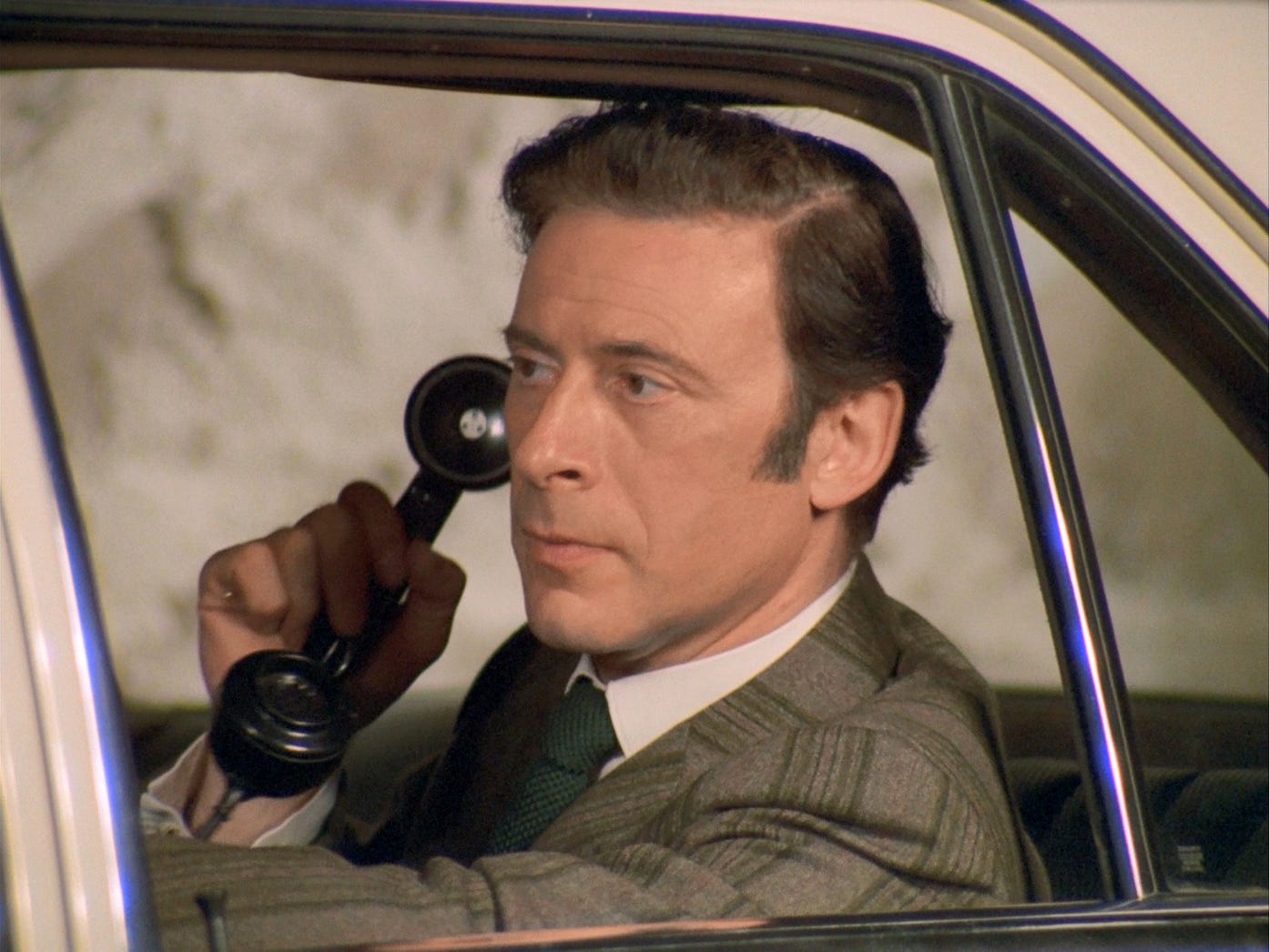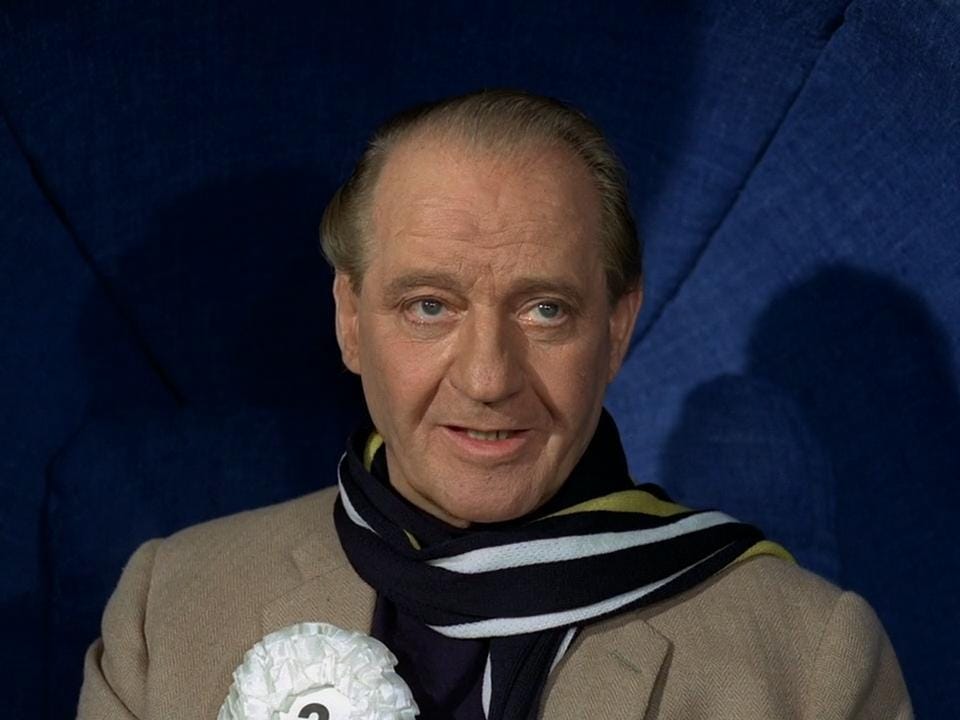Titles and the Other Voice Of The Village
A grab bag in The Bunker today, as I crack into Act 1 of ‘Free For All’ proper.
Except, hang on, one little bit of business. We have here (or in whichever episode you choose to go in second place) the debut of the standard opening titles.
The most notable thing about these is their length. The Prisoner takes a full three minutes to introduce itself every week. The Saint and Man In A Suitcase take thirty seconds (okay, some of the titles run over the opening scene-setting shots of the episode, but only for about another thirty seconds). The Prisoner feels it has to restate its premise, at length, every week. The production can’t risk any viewer going in cold.
In practice, this shaves off a few minutes from the running time of the drama. The scripts on the page are standard length for ITC. So maybe the loss of two minutes from the drama to credits explains why there are comparatively so many cut or trimmed scenes, and choppy edits.
I can’t think of another series with so little slack. If anything, you could often do with a bit more, a little breather or two, but every scene, every moment In The Prisoner carries either a story point or an important or significant detail. There are very few longueurs. The more gently paced scenes - like the Truth Test in this episode - are electrically quiet.
Back to those credits in themselves. It’s frustrating that the production hit on the great idea of introducing each new number 2 in the credits, but then neglected to collect the voices of most of the actors. This is a lot less noticeable on first viewing, when you’re coming new to each new number 2, but it’s inelegant.
This idea was settled early on - we hear the voices of Peter Wyngarde, Mary Morris and Leo McKern from the very early part of the shoot. But then, presumably, it was forgotten, though they do pick up closeups of the actors looking appropriately menacing after ‘We will’. But it’s only with Colin Gordon, right at the end of the first block, that they remember to record him doing the narration. (One of the weird edits in ‘Do Not Forsake Me’ has Clifford Evans shouting ‘Information!’ on the Living Space set, which suggests they got him, but then, ironically, they didn’t use the second ‘Village’ half of the titles for that episode.)
My theory, which I have nothing to support, is that these voice recordings were made but that they got mislaid. I only posit this because it’s such a big oversight, and it feels unlikely that such a key, repeated thing could simply be forgotten. There’s also a possibility that the narrations just weren’t good enough performances. Maniacal laughter can often go wrong and be unintentionally comic - Colin Gordon sounds like he’s having a medical episode.
So we see Eric Portman here, though the clip of his face at the appropriate moment looks like an off-cut from the very brief scene of him in the chair later on. He looks positively amiable, in fact. (They do pick up his voice to use for the radio-broadcast typing exercise in ‘Dance’ - which maybe supports my theory, a bit? Because why record once voiceover and not another?)
So it’s not Portman’s voice here, but - like every other occasion where we don’t hear the actual Number 2 in the titles - the voice of Robert Rietti (sometimes credited as Rietty, but like Fenella never credited at all on The Prisoner).

Robert Rietti (1923 -2015) had a heck of a life story - his Italian father Victor was an accomplished actor and quite a star, and they were both given the OMRI - the Italian equivalent of the OBE - on the same occasion in 1959, for services to Italian culture. Rietti junior was born in London, but briefly interned at the outbreak of WW2 (particularly ironic, as he was Italian-Jewish). He later joined the Rifle Brigade and was a leading light of Stars In Battledress, the company of actors and comedians that was (a bit) more classy than the concert parties of ENSA.
After the war, Rietti became the go-to man for voice work, redubbing hundreds of films and eventually becoming an accomplished director of ADR (automated dialogue replacement, though it was just called dubbing back then). If you’re a film buff you’ll start to hear him everywhere. He’s the voice of Adolfo Celi in Thunderball, and the voice of Tetsurō Tamba in You Only Live Twice.
The extreme length of his acting career saw him work with Orson Welles at one end and Catherine Zeta-Jones at the other.
Rietti is as much the voice of the Village as Fenella Fielding. We hear him a lot, usually being nasty. As well as the absent number 2s, he is the voice telling the Rook to go to the blue dispenser, and asking Nadia ‘were you attempting suicide’? Where Fenella is the public voice of the Village, Rietti is the voice of the under village, the business end where all the nasty stuff happens. He is often heard as various voices off - the various camera operators in ‘Its Your Funeral’, the voice chivvying the Education Board along to the meeting in ‘The General’. He is the voice of D in ‘A. B. & C.’
But we get his ‘nice’ voice too - an amiable pipe that often crops up when Village extras get lines eg ‘You’re safe, protected by the Queen’ at the chess match in ‘Checkmate’, a scene where he is also doing the voice for the Black Player, and dubbing Basil Dignam as the Supervisor for one line, ‘Control Room to hospital’.
You’ve heard his voice maybe more than any other actor’s.
Eric Portman
Eric Portman (1901-1969) was often cast as authority figures, and often Nazi authority figures like U-boat captains, so he’s an obvious choice for Number 2. He is a conspicuously top drawer turn for an ITC TV show, at the end of a long film career that made him a big British star. He would’ve been very recognisable to the British audience in 1967.
Like many a number 2, Portman was homosexual - the recently published ‘The Diary Of Mr Lucas’ contains a 1949 entry: ‘Another guardsman soon joined us, a tall sophisticated lad, a habitué of Eric Portman's and Michael Redgrave's parties’. He has a haunted and ambiguous quality on screen, even in his most straightforwardly heroic roles such as the hero of The Colditz Story.
He is best remembered now for his role of magistrate Thomas Colpeper in Powell & Pressburger’s gorgeous A Canterbury Tale of 1944, the kind of film you step into rather than just watch. I don’t want to give anything away, but Colpeper is a fascinating character, one of the many unusual things in what is nominally a wartime propaganda movie.
His number 2 is described in the script as amiable - ‘in another time and place, these two men could have been friends’ it says of him and P - and Portman switches very nicely between the bland, affable public face of authority and the terse and matter-of-fact reality that we receive in glimpses throughout, when P isn’t watching.
Keep reading with a 7-day free trial
Subscribe to The Culture Bunker to keep reading this post and get 7 days of free access to the full post archives.







